In Copenhagen, delegates discuss emissions reductions of 80 to 90 percent by mid-century. Delta asked a number of TU experts: suppose you are going to be the first minister of Energy in the next Dutch cabinet, Balkenende V, how would you proceed?
Tim van der Hagen
“We proposed a minister for energy & environment four years ago. Then it didn’t work out, but this time it might”, says professor Tim van der Hagen, president of the Delft Research Institute on Energy. “Emissions reduction is a serious problem that needs a long-term strategy. We need to calculate back from 2050 to the present, in order to determine the allowed emissions. I think we will get a scare. Just screwing in energy-efficient light bulbs won’t be enough. A change in lifestyle is unavoidable.”
The professor sketches the need to switch over from ‘dirty’ fossil energy getting dirtier and more expensive with time to emission-free sustainable energy, which is getting cheaper all the time because of the economies of scale. The difficulty with this transition is in not endangering the position of the national economy. Van der Hagen therefore argues that we need to install one or two additional nuclear plants to safeguard cheap energy production during the transition to renewable energy sources.
As a minister he would immediately ban all burning of fossil fuels without CO2 capture and storage. “Power plants should not merely be ‘capture-ready’. They should capture and store CO2. As long as CCS (Carbon Capture and Storage) is not operational, they cannot produce.” Van der Hagen would opt for one nuclear plant of the third generation, like the EPR (European Pressurized Reactor) that is under construction in Finland, and a demonstration plant featuring an inherently safe pebble-bed reactor. That would offer opportunities to develop knowledge about this new technology. Other important domains of research are solar and wind power, and second-generation biofuels. An additional billion euro per year should be invested in it to make sustainable energy affordable enough for the energy transition to occur, says the next minister for energy and economy.
,Karel Mulder: ‘Invest in future energy’
“I don’t believe in the absolute powers of a minister of energy”, says dr. Karel Mulder. “The consequences of confrontational politics often differ from what was intended. The Zero Emission Vehicle for example that Californian law makers wanted car manufacturers to develop mainly produced court cases and appeals. The most environmentally friendly car meanwhile was produced in Japan.”
Mulder is on a sabatical at the Royal Technical University (Kungliga Tekniska Högskolan) in Stockholm, Sweden. After having spent much time lobbying for sustainability in Delft, the researcher from the faculty of Technology, Policy and Management welcomes the opportunity to be more involved in the content again. Naturally, he still works on sustainability issues.
Sweden is a lot more active in sustainability, he observes. “They have really brought their emissions down here, whereas the Netherlands is struggling to stay within the Kyoto targets.” Statistics support his claim: Sweden is already 13 percent below its 2012 Kyoto target; Holland is still 3.5 percent over it. So how did they do it? Mulder: “They extensively use the abundant biofuels here, which they burn in combined heat-power facilities. Public transport in Stockholm is all biofuel-powered; they make experimental use of heat from waste water and they have introduced a peak-hour pricing for cars in Stockholm of about 1.5 to 2 euro, which has really helped in reducing traffic. Meanwhile the Swedes have been investing in public transport as well.”
Investments that Mulder proposes are in the energy-efficiency of buildings, transport and industry; in the European grid to make it resilient to fluctuations in wind and solar power; and in a smart grid allowing households to sell power. These investments should be financed by making fossil energy, be it power, fuel or gas more expensive. Mulder: “Better raise energy prices and develop alternatives now than wait until production can’t meet the growing demand and face an energy crisis.”
,Andy van den Dobbelsteen: ‘Time to kick the habit’
‘Time to kick the habit’
“The whole society is hooked on the energy drip”, says professor Andy van den Dobbelsteen (Architecture). “It’s about time to kick the habit.” We need a better understanding of what energy sources are locally available, says the professor of design for sustainability. His group conducted studies on the potential of sustainable energy in Rotterdam and in small villages. They concluded that much was to be won by basing the spatial planning on energy needs and production. “In cities, one building is cooled and another heated, without any connection between the two. Offices are heated five days a week, when apartments generally are not. An intelligent exchange of heat between the two can save a lot of energy.”
As the energy minister, Van den Dobbelsteen would demand that all new building projects are energy neutral, meaning that over a year the same amount of energy is locally produced as is used. “Technically, it’s feasible, but because no one demands it, new neighbourhoods are not made energy neutral.” Mixed areas of housing, industry and agriculture seem to offer the best opportunities for energy neutrality. “You either have to build at a spot where the energy is, be it a power plant, industry, greenhouses or a drilling point for thermal energy. Or you have to move the energy into the housing areas.” Mandatory energy neutrality would force planners to think about a smart mix of functions instead of just taking the energy for granted.
Existing buildings should be renovated to reduce their energy needs. Van den Dobbelsteen: “The current government doesn’t stimulate insulation programs, but I would do so right away, because in 20 years time, 95 percent of the same buildings will still be here.”
,Margot Weijnen: ‘Asia might take the lead’
“Working at a technical university, we of course have full confidence in technology”, says professor Margot Weijnen, with a hint of irony. The power-grid expert from the faculty of Technology, Policy and Management agrees with the other colleagues that improving energy efficiency in buildings (a third of primary energy use) should be high on the list. Not surprisingly perhaps, Weijnen strongly believes in electric transport. Not only because it’s more energy efficient, but also to reduce dust particles in metropolitan air.
The main power producers in her perspective should be Saharan solar farms (concentrated solar power or CSP) and nuclear power. CSP does need a large scaling-up – the current maximum is 300 megawatt for a project in Sevilla. Furthermore Europe needs to invest in long distance power cables (high voltage direct current or HVDC) to bring the solar power into the European grid. She hopes a fleet of electric cars will be able to function as a power buffer with fluctuating inputs from wind.
“But in fact, the whole focus on CO2 is misleading”, says Weijnen. “It’s an end-of-the line solution that deals with the symptoms only. The only way to really tackle the energy issue is through international collaboration.” And there we face immense inequalities. “Asia wants to grow, but they’ll face trouble importing all the fossil fuel they need.” In her contacts with people from China and India, Weijnen noticed a growing awareness of the energy problems in Asia. Weijnen: “We have our habits and comfort. They have more liberty in designing their cities and industries more sustainably. Perhaps we should hope for them to take the lead.”
,David Keyson: ‘Economic incentives work’
As the minister of energy, industrial design professor David Keyson would develop a smart decentralized grid so that people can generate sustainable energy themselves and sell their surplus to the energy grid. “Look at Germany”, he says. “There people can sell as much electricity as they want to the grid. In Holland the amount is very limited.” The grid should be smart in the sense that it would enable us to store energy locally when there is an excess and it should communicate with the end users the prices they pay for electricity at any given moment. Keyson: “That way people can choose when to turn on their dryer for instance.”
He would also use taxes to change people’s behaviour: “Research shows that people only change their behaviour through economic incentives, not because they are concerned about the climate. Look at the success of the Prius car here. It’s popular because it is free of purchase taxes.”
Financial incentives could make the Dutch car park a lot greener. “Holland is an ideal country for electric cars,” he believes. “The average drive is only about 30 kilometres and there are no mountains, so cars don’t need a lot of power.”
Keyson would free all electric cars of taxes and he would let drivers of fossil fuel powered vehicles pay more taxes. He would give incentives for farmers to operate windmills, lower the city property tax for energy efficient houses, and tax homes and businesses using non-green energy.
Under his rule, the profits from the Dutch gas fields would go straight into sustainable technology development. And he would also divert more money from NWO, STW, Senter Novem and EU funding towards research projects on sustainability. Keyson: “And I would create a massive education program for elementary and high schools on sustainability.”
,Ad Verkooijen: ‘Windparks with nuclear back-up’
“I wouldn’t take measures that drastically affect people’s way of life”, says professor Ad Verkooijen, of the process and energy department (Faculty of Mechanical, Maritime and Materials Engineering). “Allowing people to drive only half what they used to is not a sustainable solution.”
One of Verkooijen’s main research topics is carbon capture and storage. “As the Minister of Energy I would invest in that method,” he states. Although the technique for capturing CO2 still needs to be improved, Verkooijen thinks that for the short term this is a good way to prevent carbon dioxide from being emitted.
“But if I look deep in my heart, I prefer the installation of nuclear power plants”, the professor says. “Why prevent produced carbon dioxide from being emitted, if you can also prevent it from being produced in the first place? We should build a few big plants of around 1500 megawatt. With each such plant you avoid the emission of 6 million tons of CO2 a year.
“Furthermore, all wind parks should be accompanied by a small nuclear power plant. Now the lows in wind energy have to be compensated for by gas power plants. These power plants don’t work efficiently if you have to turn them on and off all the time. With nuclear power plants that’s no problem.”
In the long run Verkooijen wouldn’t waste his money on windmills, however. “The most wind is at sea,” he explains. “But it’s difficult to install mills there. And the maintenance and transport of the energy is also complicated. With windmills you pile up one problem on top of the other.
“After 2050, when solar panels are less expensive, we should only use solar and nuclear energy. And we should have a world covering electricity grid.” Verkooijen would also make sure that houses become better insulated and become linked to district heating systems.
Inholland experimenteert sinds vorig jaar met intakegesprekken voor aankomende studenten. Komend studiejaar moeten alle studiekiezers voor zo’n gesprek in aanmerking komen. De hogeschool hoopt zo te voorkomen dat scholieren op basis van onjuiste informatie een verkeerde studiekeuze maken. Bovendien kunnen ze dan in de zomer worden bijgespijkerd, zodat ze in september beter voorbereid aan de start verschijnen.
Ook voor hogescholen en universiteiten zijn late inschrijvingen niet handig. Maar door de onderlinge concurrentiestrijd wil geen enkele instelling er als eerste mee beginnen. En dus moet minister Plasterk met een oplossing komen, vindt Dales.
“Honderden studenten melden zich pas na 15 juni bij ons aan”, zegt een woordvoerder van Inholland. Welk percentage daarvan uitvalt, en of dat hoger ligt dan onder vroege kiezers, kan hij niet zeggen. “Waar het ons om gaat is dat studenten zich eerder inschrijven, zodat we ze beter kunnen voorbereiden.” Vijftien juni – vóór de herkansingen in het voortgezet onderwijs – is slechts “een voorbeelddatum”, maar niet geheel arbitrair: op dit moment worden scholieren al verzocht zich vóór 15 juni aan te melden, maar in de praktijk kunnen studiekiezers bij de meeste instellingen nog tot 1 oktober terecht.
Doekle Terpstra, voorzitter van de HBO-raad, onderkent in Volkskrant de bezwaren tegen het late inschrijven, maar wil niet weten van een harde deadline: “We moeten juist meer luisteren naar wat de studenten van ons willen, dus we zullen juist flexibeler moeten worden.”
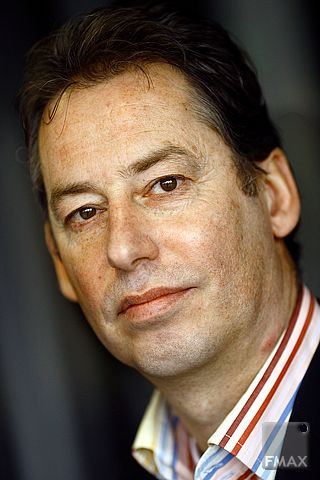

Tim van der Hagen
“We proposed a minister for energy & environment four years ago. Then it didn’t work out, but this time it might”, says professor Tim van der Hagen, president of the Delft Research Institute on Energy. “Emissions reduction is a serious problem that needs a long-term strategy. We need to calculate back from 2050 to the present, in order to determine the allowed emissions. I think we will get a scare. Just screwing in energy-efficient light bulbs won’t be enough. A change in lifestyle is unavoidable.”
The professor sketches the need to switch over from ‘dirty’ fossil energy getting dirtier and more expensive with time to emission-free sustainable energy, which is getting cheaper all the time because of the economies of scale. The difficulty with this transition is in not endangering the position of the national economy. Van der Hagen therefore argues that we need to install one or two additional nuclear plants to safeguard cheap energy production during the transition to renewable energy sources.
As a minister he would immediately ban all burning of fossil fuels without CO2 capture and storage. “Power plants should not merely be ‘capture-ready’. They should capture and store CO2. As long as CCS (Carbon Capture and Storage) is not operational, they cannot produce.” Van der Hagen would opt for one nuclear plant of the third generation, like the EPR (European Pressurized Reactor) that is under construction in Finland, and a demonstration plant featuring an inherently safe pebble-bed reactor. That would offer opportunities to develop knowledge about this new technology. Other important domains of research are solar and wind power, and second-generation biofuels. An additional billion euro per year should be invested in it to make sustainable energy affordable enough for the energy transition to occur, says the next minister for energy and economy.
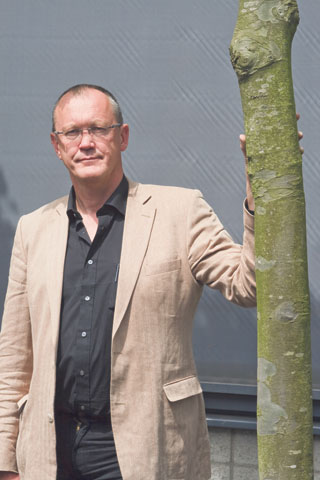

Karel Mulder: ‘Invest in future energy’
“I don’t believe in the absolute powers of a minister of energy”, says dr. Karel Mulder. “The consequences of confrontational politics often differ from what was intended. The Zero Emission Vehicle for example that Californian law makers wanted car manufacturers to develop mainly produced court cases and appeals. The most environmentally friendly car meanwhile was produced in Japan.”
Mulder is on a sabatical at the Royal Technical University (Kungliga Tekniska Högskolan) in Stockholm, Sweden. After having spent much time lobbying for sustainability in Delft, the researcher from the faculty of Technology, Policy and Management welcomes the opportunity to be more involved in the content again. Naturally, he still works on sustainability issues.
Sweden is a lot more active in sustainability, he observes. “They have really brought their emissions down here, whereas the Netherlands is struggling to stay within the Kyoto targets.” Statistics support his claim: Sweden is already 13 percent below its 2012 Kyoto target; Holland is still 3.5 percent over it. So how did they do it? Mulder: “They extensively use the abundant biofuels here, which they burn in combined heat-power facilities. Public transport in Stockholm is all biofuel-powered; they make experimental use of heat from waste water and they have introduced a peak-hour pricing for cars in Stockholm of about 1.5 to 2 euro, which has really helped in reducing traffic. Meanwhile the Swedes have been investing in public transport as well.”
Investments that Mulder proposes are in the energy-efficiency of buildings, transport and industry; in the European grid to make it resilient to fluctuations in wind and solar power; and in a smart grid allowing households to sell power. These investments should be financed by making fossil energy, be it power, fuel or gas more expensive. Mulder: “Better raise energy prices and develop alternatives now than wait until production can’t meet the growing demand and face an energy crisis.”
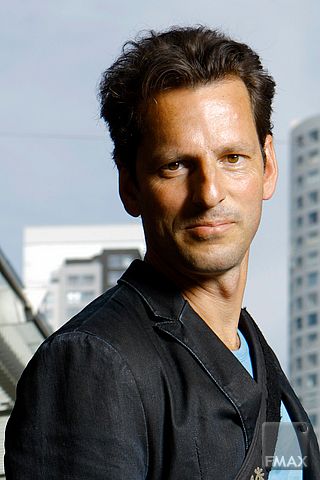

Andy van den Dobbelsteen: ‘Time to kick the habit’
‘Time to kick the habit’
“The whole society is hooked on the energy drip”, says professor Andy van den Dobbelsteen (Architecture). “It’s about time to kick the habit.” We need a better understanding of what energy sources are locally available, says the professor of design for sustainability. His group conducted studies on the potential of sustainable energy in Rotterdam and in small villages. They concluded that much was to be won by basing the spatial planning on energy needs and production. “In cities, one building is cooled and another heated, without any connection between the two. Offices are heated five days a week, when apartments generally are not. An intelligent exchange of heat between the two can save a lot of energy.”
As the energy minister, Van den Dobbelsteen would demand that all new building projects are energy neutral, meaning that over a year the same amount of energy is locally produced as is used. “Technically, it’s feasible, but because no one demands it, new neighbourhoods are not made energy neutral.” Mixed areas of housing, industry and agriculture seem to offer the best opportunities for energy neutrality. “You either have to build at a spot where the energy is, be it a power plant, industry, greenhouses or a drilling point for thermal energy. Or you have to move the energy into the housing areas.” Mandatory energy neutrality would force planners to think about a smart mix of functions instead of just taking the energy for granted.
Existing buildings should be renovated to reduce their energy needs. Van den Dobbelsteen: “The current government doesn’t stimulate insulation programs, but I would do so right away, because in 20 years time, 95 percent of the same buildings will still be here.”
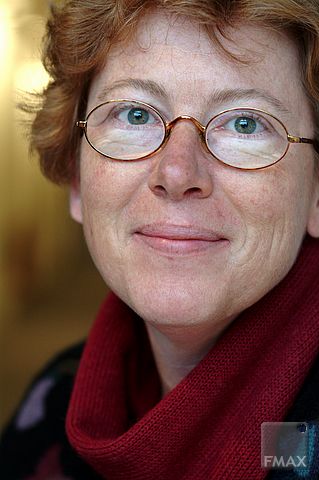

Margot Weijnen: ‘Asia might take the lead’
“Working at a technical university, we of course have full confidence in technology”, says professor Margot Weijnen, with a hint of irony. The power-grid expert from the faculty of Technology, Policy and Management agrees with the other colleagues that improving energy efficiency in buildings (a third of primary energy use) should be high on the list. Not surprisingly perhaps, Weijnen strongly believes in electric transport. Not only because it’s more energy efficient, but also to reduce dust particles in metropolitan air.
The main power producers in her perspective should be Saharan solar farms (concentrated solar power or CSP) and nuclear power. CSP does need a large scaling-up – the current maximum is 300 megawatt for a project in Sevilla. Furthermore Europe needs to invest in long distance power cables (high voltage direct current or HVDC) to bring the solar power into the European grid. She hopes a fleet of electric cars will be able to function as a power buffer with fluctuating inputs from wind.
“But in fact, the whole focus on CO2 is misleading”, says Weijnen. “It’s an end-of-the line solution that deals with the symptoms only. The only way to really tackle the energy issue is through international collaboration.” And there we face immense inequalities. “Asia wants to grow, but they’ll face trouble importing all the fossil fuel they need.” In her contacts with people from China and India, Weijnen noticed a growing awareness of the energy problems in Asia. Weijnen: “We have our habits and comfort. They have more liberty in designing their cities and industries more sustainably. Perhaps we should hope for them to take the lead.”
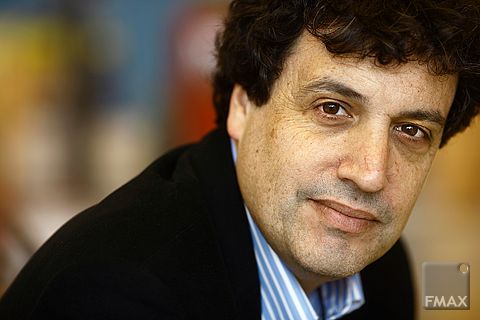

David Keyson: ‘Economic incentives work’
As the minister of energy, industrial design professor David Keyson would develop a smart decentralized grid so that people can generate sustainable energy themselves and sell their surplus to the energy grid. “Look at Germany”, he says. “There people can sell as much electricity as they want to the grid. In Holland the amount is very limited.” The grid should be smart in the sense that it would enable us to store energy locally when there is an excess and it should communicate with the end users the prices they pay for electricity at any given moment. Keyson: “That way people can choose when to turn on their dryer for instance.”
He would also use taxes to change people’s behaviour: “Research shows that people only change their behaviour through economic incentives, not because they are concerned about the climate. Look at the success of the Prius car here. It’s popular because it is free of purchase taxes.”
Financial incentives could make the Dutch car park a lot greener. “Holland is an ideal country for electric cars,” he believes. “The average drive is only about 30 kilometres and there are no mountains, so cars don’t need a lot of power.”
Keyson would free all electric cars of taxes and he would let drivers of fossil fuel powered vehicles pay more taxes. He would give incentives for farmers to operate windmills, lower the city property tax for energy efficient houses, and tax homes and businesses using non-green energy.
Under his rule, the profits from the Dutch gas fields would go straight into sustainable technology development. And he would also divert more money from NWO, STW, Senter Novem and EU funding towards research projects on sustainability. Keyson: “And I would create a massive education program for elementary and high schools on sustainability.”
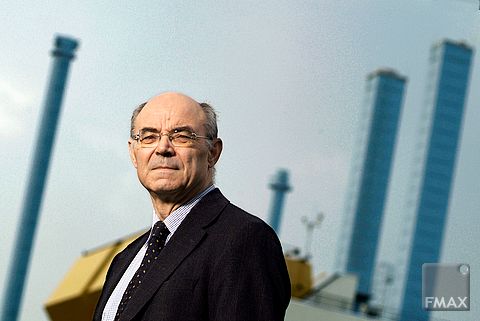

Ad Verkooijen: ‘Windparks with nuclear back-up’
“I wouldn’t take measures that drastically affect people’s way of life”, says professor Ad Verkooijen, of the process and energy department (Faculty of Mechanical, Maritime and Materials Engineering). “Allowing people to drive only half what they used to is not a sustainable solution.”
One of Verkooijen’s main research topics is carbon capture and storage. “As the Minister of Energy I would invest in that method,” he states. Although the technique for capturing CO2 still needs to be improved, Verkooijen thinks that for the short term this is a good way to prevent carbon dioxide from being emitted.
“But if I look deep in my heart, I prefer the installation of nuclear power plants”, the professor says. “Why prevent produced carbon dioxide from being emitted, if you can also prevent it from being produced in the first place? We should build a few big plants of around 1500 megawatt. With each such plant you avoid the emission of 6 million tons of CO2 a year.
“Furthermore, all wind parks should be accompanied by a small nuclear power plant. Now the lows in wind energy have to be compensated for by gas power plants. These power plants don’t work efficiently if you have to turn them on and off all the time. With nuclear power plants that’s no problem.”
In the long run Verkooijen wouldn’t waste his money on windmills, however. “The most wind is at sea,” he explains. “But it’s difficult to install mills there. And the maintenance and transport of the energy is also complicated. With windmills you pile up one problem on top of the other.
“After 2050, when solar panels are less expensive, we should only use solar and nuclear energy. And we should have a world covering electricity grid.” Verkooijen would also make sure that houses become better insulated and become linked to district heating systems.


Comments are closed.